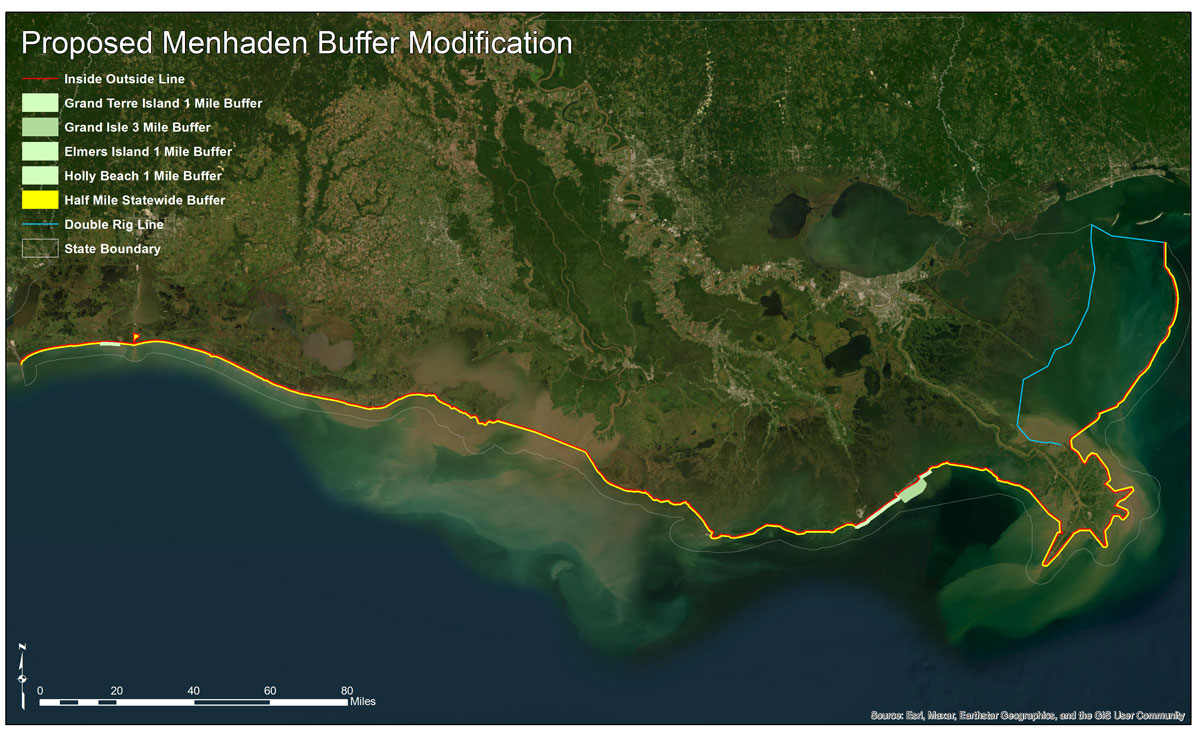
“Compromise” reduces previously proposed one mile limit to half mile
Commercial menhaden fisheries will now have to adhere to a half-mile buffer on the Louisiana coast. The Louisiana Wildlife and Fisheries Commission unanimously passed the emergency regulations that created buffers for the 2024 season in a special-called meeting Thursday, Feb. 15.
Five minutes after opening the meeting, commissioners offered a motion to pass the modified regulations, even though details of modifications to the previous NOI had not been publicly discussed or read at the meeting.
However, a public comment period was then offered on the modifications to the NOI, again without the entire scope of the new proposal being discussed at the meeting.
Mended fences
During the public comment period, conservation groups and commercial menhaden fisheries operators had suddenly “mended fences” after arguing for years. Comments from both sides highly praised commissioners on the new regulations. Both sides agreed that compromises were made but in the long run would be beneficial. This came just two weeks after many of the same representatives of the same groups were miles apart in their positions. The LWFC declined to vote on its own previous Notice of Intent, which had proposed a one-mile buffer at that time. Instead, they asked both sides of the issue to work out a compromise. Even though that had failed many times before, this time it was reached in just one quick meeting.

Francois Kuttel, president of Westbank Fishing, LLC, pleaded with commissioners and those present for unity.
“As they say, compromise is something that both parties do not like but can live with,” Kuttel said. “Commercial fishing in this state is under threat. Let’s not lob grenades at each other. Let’s work together to get a better Louisiana.”
Ben Landry, who represented Omega Protein, a menhaden fishing corporation, said his company “looked forward” to the buffer zones. They have been regular representatives of the two large foreign-owned companies that pogie fish Louisiana’s coast.
“Appreciate commissioners leadership,” Landry said. “We simply look forward to operating our fishing operations in 2024 with these new rules. We look for a safe and productive harvest. Anything we can participate in with additional research and improve the understanding of the fishery, we have a history of supporting.”
Manage the industry
Charlie Caplinger, chairman of CCA Louisiana, thanked the group.
“Thank you commissioners for taking these steps to manage the industry,” Caplinger said. “I really want to thank our legislators who kept this issue in the forefront and made sure that the 400,000 anglers were represented here.”
Rep. Joe Orgeron, District 54, who has been involved with menhaden fisheries legislation, also said the buffers were a compromise.
“Three years ago I proposed some common sense legislation on this particular industry and was unsuccessful even following compromise,” Orgeron said. “As a representative of the people, many of which will not be happy, that is what a compromise is. I will continue to represent those people and keep a very close eye on the pogie industry and the stakeholder’s request and requirements.”
Concerned sportsmen and environmentalists not involved in the compromise and who are worried about declining speckled trout and redfish populations and damage to Louisiana’s fragile coastline are among those not happy.
Following the results of the meeting, several pointed out that the pogie industry, with its considerable political clout, gave up 1/4 mile in the compromise and the sportsfishing side gave up 1/2 mile in compromise from the original NOI passed by the Commission. The three-mile buffer off Grand Isle and one-mile buffer off Holly Beach remain in the modified rules.
No guarantee
Later in the meeting, Kuttel and Landry assured commissioners their respective companies have bought new nets that should prevent as many spills and tears as has occurred the past several years. West Bank has purchased new Spectra nets for each boat, a product that, according to Kuttel, is tougher than nylon.
But, Kuttel added, “I can’t guarantee that nothing ever is going to happen.”
Along with nets, Landry said his company has bought equipment that will be used as a fish skimmer to help clean up spills of dead fish so not as many will reach shore.
The Commission also had to pass a Declaration of Emergency to allow the new rules to go into effect before the April 15 opening of the 2024 menhaden season without the customary public legal postings, comment periods and Legislative Oversight.
Thursday’s Commission action doesn’t totally put the pogie fishing controversy to rest. A comprehensive bycatch study to determine the waste of valuable sports fish resources caused by the pogie fishing process is planned and at least one speaker encouraged the Commission to not let those efforts die.
Bycatch study
Chris Macaluso with the Theodore Roosevelt Conservation Partnership urged Commissioners to have the groups conducting the proposed bycatch study to make presentations to the group and “to get some clarity on what those will produce.” He also said these efforts need to continue in a timely manner to protect beaches and coastal fishery resources.
“Conserving and protecting Louisiana’s vast but diminishing coastal fisheries and critical barrier islands, beaches and marshes has been the goal of our coalition for the last five years,” Macaluso said. “We have consistently worked with the Wildlife and Fisheries Commission, Department of Wildlife and Fisheries staff, concerned anglers, charter captains, conservationists, lawmakers at every level and the menhaden industry to enact meaningful regulations that can help accomplish that goal while recognizing the importance of commercial fisheries to Louisiana’s economy and culture. The Commission deserves a lot of credit for recognizing the validity of our coalition’s concerns and taking a big step forward in protecting Louisiana’s coast.”
Conservation and sportsmen groups have also called for stricter monitoring of daily pogie operations, consistent enforcement of the regulations and stiffer penalties for violators. Those needs have not gone away even with a new buffer limit.